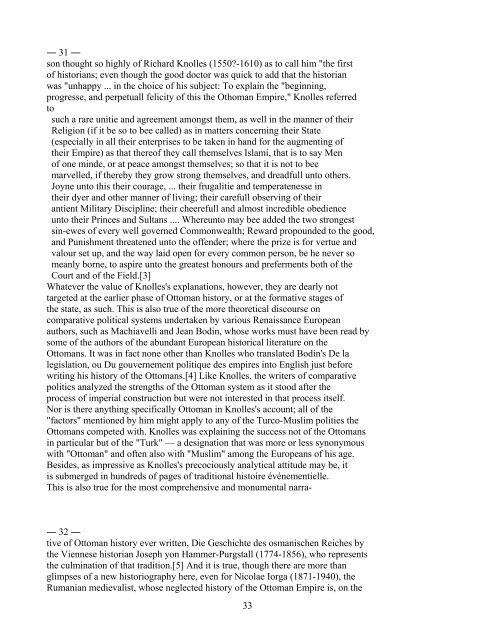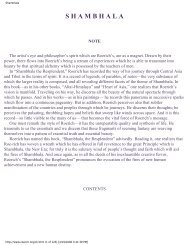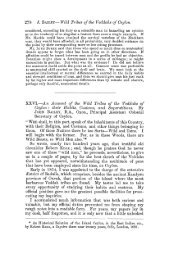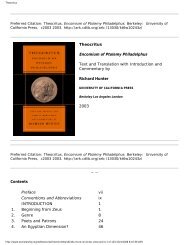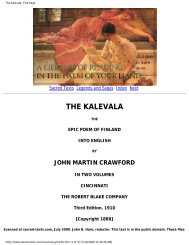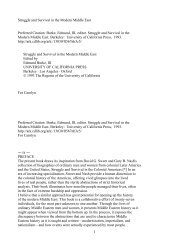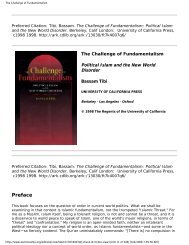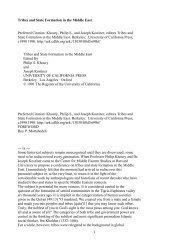Between Two Worlds Kafadar.pdf
Between Two Worlds Kafadar.pdf
Between Two Worlds Kafadar.pdf
You also want an ePaper? Increase the reach of your titles
YUMPU automatically turns print PDFs into web optimized ePapers that Google loves.
― 31 ―<br />
son thought so highly of Richard Knolles (1550?-1610) as to call him "the first<br />
of historians; even though the good doctor was quick to add that the historian<br />
was "unhappy ... in the choice of his subject: To explain the "beginning,<br />
progresse, and perpetuall felicity of this the Othoman Empire," Knolles referred<br />
to<br />
such a rare unitie and agreement amongst them, as well in the manner of their<br />
Religion (if it be so to bee called) as in matters concerning their State<br />
(especially in all their enterprises to be taken in hand for the augmenting of<br />
their Empire) as that thereof they call themselves Islami, that is to say Men<br />
of one minde, or at peace amongst themselves; so that it is not to bee<br />
marvelled, if thereby they grow strong themselves, and dreadfull unto others.<br />
Joyne unto this their courage, ... their frugalitie and temperatenesse in<br />
their dyer and other manner of living; their carefull observing of their<br />
antient Military Discipline; their cheerefull and almost incredible obedience<br />
unto their Princes and Sultans .... Whereunto may bee added the two strongest<br />
sin-ewes of every well governed Commonwealth; Reward propounded to the good,<br />
and Punishment threatened unto the offender; where the prize is for vertue and<br />
valour set up, and the way laid open for every common person, be he never so<br />
meanly borne, to aspire unto the greatest honours and preferments both of the<br />
Court and of the Field.[3]<br />
Whatever the value of Knolles's explanations, however, they are dearly not<br />
targeted at the earlier phase of Ottoman history, or at the formative stages of<br />
the state, as such. This is also true of the more theoretical discourse on<br />
comparative political systems undertaken by various Renaissance European<br />
authors, such as Machiavelli and Jean Bodin, whose works must have been read by<br />
some of the authors of the abundant European historical literature on the<br />
Ottomans. It was in fact none other than Knolles who translated Bodin's De la<br />
legislation, ou Du gouvernement politique des empires into English just before<br />
writing his history of the Ottomans.[4] Like Knolles, the writers of comparative<br />
politics analyzed the strengths of the Ottoman system as it stood after the<br />
process of imperial construction but were not interested in that process itself.<br />
Nor is there anything specifically Ottoman in Knolles's account; all of the<br />
"factors" mentioned by him might apply to any of the Turco-Muslim polities the<br />
Ottomans competed with. Knolles was explaining the success not of the Ottomans<br />
in particular but of the "Turk" — a designation that was more or less synonymous<br />
with "Ottoman" and often also with "Muslim" among the Europeans of his age.<br />
Besides, as impressive as Knolles's precociously analytical attitude may be, it<br />
is submerged in hundreds of pages of traditional histoire événementielle.<br />
This is also true for the most comprehensive and monumental narra-<br />
― 32 ―<br />
tive of Ottoman history ever written, Die Geschichte des osmanischen Reiches by<br />
the Viennese historian Joseph yon Hammer-Purgstall (1774-1856), who represents<br />
the culmination of that tradition.[5] And it is true, though there are more than<br />
glimpses of a new historiography here, even for Nicolae Iorga (1871-1940), the<br />
Rumanian medievalist, whose neglected history of the Ottoman Empire is, on the<br />
33


